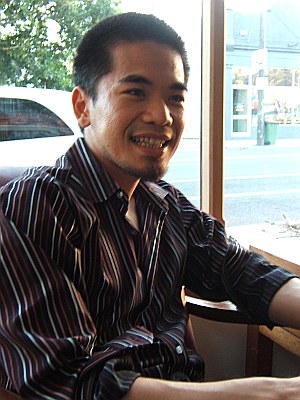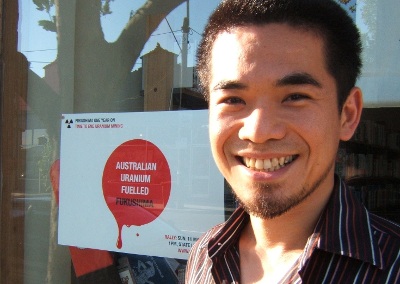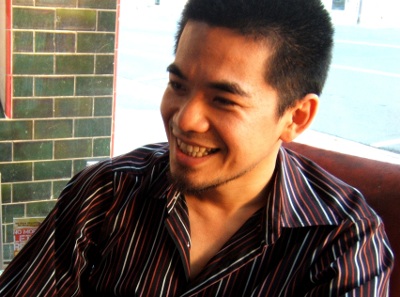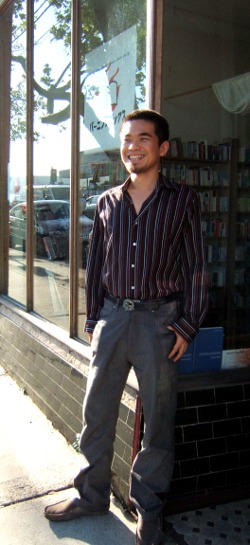English Japanese
March 11, 2011.
Every Japanese person in Melbourne was staring at the TV, could not believe their eyes due to the severity of the impact.
March has gone, a month in which they were shedding tears, their hearts sunk, and they were eager to get in touch with their family and friends in Japan. The feeling that “we have to do something” was evoked among the community and numerous charity activities were carried out in the next few months.
And now, almost one year has passed.
It is unlikely to forget such an impact, however, while living a busy daily life in a foreign country far away from Japan, are we spending less and less time dedicating our thoughts for the disaster areas, victims and the yet to be settled nuclear power plant disaster?
“The earthquake and Fukushima disaster are history-of-man occurrences.
Just like the atomic bombings of Hiroshima and Nagasaki, I think, to Japanese people it should never be forgotten.
To make sure of this, I sincerely invite you to come and join us on March 11. ”
The above words are from Kentaro Yamaki, the member of Japanese for Peace (JfP) which is a Melbourne based peace group. There may be some readers remembering him, who appeared in the popular column “Gouji” of GoGo Melbourne.
On Sunday March 11, one year after the quake and the nuclear power plant accident, the event “11 March: Day of Action to End Uranium Mining, Fukushima One Year One” will be held at Jfp cooperated by local NGOs.
Fellow readers, do you know that in fact the nuclear power plant disaster of Fukushima is not totally irrelevant to Australia?
At the end of October last year, Australian federal government officially admitted/declared that Australian uranium was contained in the nuclear fuel currently used in the Fukushima Daiichi Nuclear Powerplant.
Moreover, the uranium is dug from the land where the native Australian people, Aboriginals, have been living over many generations. Consequently, the environment is damaged, groundwater and soil has been constantly polluted.
The Kakadu land in Northern Territory is a traditional estate of the Aboriginal Mirrar people. Mirarr Senior Traditional Owner Yvonne Margarul has been continuing to lead the fight against uranium mining.
In her letter to UN Secretary-General Ban Ki-moon in April, three weeks after the earthquake, she wrote:
“Given the long history between Japanese nuclear companies and Australian uranium miners, it is likely that the radiation problems at Fukushima are, at least in part, fuelled by uranium derived from our traditional lands. This makes us feel very sad .”
A vicious nuclear cycle.
The nuclear power plant disaster is such a sad connection between Japan and Australia.
March 11.
To mourn for those who lost their lives in the earthquake and tsunami,
To put our hearts for supporting those who are continuing to incur the costs of the accident of Fukushima Daiichi Nuclear Power Station,
And to raise the voice of the opposition to Australia’s uranium mining that is connected with the nuclear disaster and the vicious cycle of nuclear,
It is the assembly of this day, which has been planned and organised by JfP in cooperation with local anti-nuclear, anti-war and environmental NGOs.
“Now in Japan, lots of young people, mothers, musicians and artists are increasingly involved in anti-nuclear movement.
As a result of experiencing the feeling of ‘threat to our lives’ and ‘an approaching real danger’ for the first time since we were born, I think it is quite a natural movement.
Learning from March 11, Japan’s new role to perform is expected from the world.
In the wake of this accident, I believe it should be the scenario that nuclear power becomes the energy of the old age, and from now on it becoming the era of alternative types of energy such as solar, wind power and geothermal energy.
I also want to contribute in accelerating the development of that scenario.”
says Kentaro.
When asked “Have you been involved with anti-nuclear activities since before?”, a unexpected answer is received:
“I had been having a strong feeling of repulsion and refusal towards radioactivity in the old days.
An image like ‘radioactivity or nuclear power plant’ equals ‘evil’ was extremely deep-rooted.
So, to those campaigns such as ‘STOP! Rokkasho’ and ‘Stop Hamaoka Nuclear Power Generation’, which were active when I was working in the ‘Peace Boat’ of NGO in Japan, I use to say ‘hum…maybe not for me…’ and stayed away. Of course it’s different now 😀 ”
“Radioactivity = the dirty thing”
Kentaro’s seemingly abnormal physiological feeling of repulsion comes from the deep influence he received from Germany, the country in which he lived from two years old to nine years old.
Germany is one of the countries that set policies to abandon nuclear energy promptly after the accident.
“German people are those who love nature very much.
A few years ago, the political party of Greens was in power.
The decision to abandon nuclear energy was made at that time, however, when the other Party called CDU came into power, it was reversed.
At such a time Fukushima’s accident occurred.
Germany’s feeling of repulsion towards nuclear power is stronger than any other country’s, to such an extent that they swiftly moved their embassy from Tokyo to Osaka.
Therefore, even CDU feels ‘Fine, if we don’t abandon nuclear power, there’s no chance for us to get the support of our people’ and thus made the decision to abolish nuclear power plants immediately.”
As such Germany,
especially the East Berlin where he spent three years from 6 to 9 years old, is “the original form of me” according to Kentaro.
▪ Germany and Japan
One of Kentaro’s “original scenery”
is East and West Germany before the Wall fell.
“I lived in East Berlin, together with my parents from 6 to 9 years old.
I used to go between east and west, the looks of the cities were completely different between the east and west.
From the running cars to clothes, the West was absolutely cooler.
In the East, I could feel some kinds of toxic substance flying in the air (laugh), billows of coal dust, and there was only one brand of food available.
Out of the curiosity of a child, I asked my Dad “why?”
Although I was told about the reason, I could not understand it.
‘How complicated and stupid the adults are by building a wall, and killing people!’ I thought it was full of irony and contradiction.”
While having such feeling, Germany has become an exciting place.
I returned Japan when I was nine. Half a year after that, the Wall fell.
Due of the rise of “People’s Power” in the summer of 1989, such an authoritative wall that had been separating the east and west, simply collapsed.
It felt unreal.” Says Kentaro.
Then, there came the life that he was looking forward as returning to Japan.
Being alienated as “a strange Japanese” by the exclusive group mentality, the school life became boring gradually.
He felt a sense of not belonging towards the society which is overflowed by various kinds of goods, as well as the classmates who always talk about things from TV.
“I realised that I was constantly comparing Germany with Japan, was always like a bystander.
Although I had friends, but can’t say whether there was anyone who truly understands me.
That was my teenage time, full of frustration.”
▪”Jomon Samba”, India and the “Boat”
He studied commerce in the university in Tokyo.
he wanted to do literature indeed, but his parents said to him that “Literature can’t feed you”.
“Commerce is the science of ‘how to sell things to people’.
By studying that, I came to well understand the theory and the mechanisms of Japanese society.
Then, I started to dislike Capitalism. (laugh)
I even felt that it was a wrong era for me to be born in the modern society where people live as consumers.”
What can one do to oppose the materialism and capitalism?
He went to some sociology seminars which were irrelevant to commerce, as well as studied now and then about religion, culture and anthropology.
And then, with 10 friends who had the same wave-length as the frustlated me, I had been doing street performances called Jomon Samba.
The concept was going back to the primitive state while dancing happily with the music. I was blowing a didgeridoo.
We performed in various places and talked to all kinds of people. It seemed that many people were tired.
Introduced by the professor who I knew well, I had also received an invitation from the producer of TBS, who sponsored a group named “Committee of thinking about peace in the soles of the feet”. We performed live music to protest against the Iraq War after 911.
“However, we thought demonstration was not quite our image. Groups of people holding flags and yelling ‘ Ei-Ei-Oh-!’, looks gloomy and lame (laugh).”
That was his college days.
While having fun in those days when he used to play at clubs, he didn’t stop thinking about what will remain behind after the fun time, and what the meaning of living is.
After graduation, disappointed by the society of Japan, Kentaro did not choose the normal career path. Instead, he saved money by doing part-time jobs and travelled around Asia for 9 months, mainly in India.
Nonetheless, the journey that was planned by him to find “the meaning of life, the meaning of living”, that he thought he could find the answer in India, got him even more confused.
It does no help to criticise Japan from the outside.
“I was escaping”, he thought.
And he went back to Japan.
What he met when he returned Japan was the Japanese NGO “Peace Boat”, which encouraged international communication via a round-the-world sea trip.
‘My first sea trip will be THIS!’ I thought it was such a large-scaled event for the young people who have the same thoughts as me to get together and doing meaningful things.’
Working as a staff in the international fields, my vision to the world was broadened rapidly.
Meanwhile, my antipathy grew stronger towards materialism and world’s deeper and darker inhumane side such as war, tyrannical governments, massacre and so on.
▪ Meeting with those who fight
“I believe there are a lot of people fighting for this in a lot of places around the world.” He met staff from various NGOs and numerous activists during the trip of Peace Boat, his individual journey around the world.
When he was in India, he participated in the “World Social Forum” which is a forum for global social activities.
Opposed to the “World Economic Forum”, which holds its annual meeting in Switzerland by gathering the world’s top business leaders, the Brazilian originated “World Social Forum” was held in India during Kentaro’s stay in 2004.
“The forum was intensive.
I was particularly impressed by the farmers in Kerala, India.
The underground water dried up because of the coke factory. Consequently, agricultural water could no longer be obtained.
Farmers thus, were protesting surrounding the factory every day, and the factory was finally withdrawn.
This is an example introduced to show how we can achieve it, and by what means are we able to grasp the neck of large companies.
One more thing, the train to the venue of this forum went through the largest slum in India.
There were shanties barely standing outside of the window along the track, and I could clearly see the life inside them.
Right in the middle of such a slum, there stood a billboard, showing a well-dressed young man driving a shiny car. That was a very symbolic view.”
Young Robert is from Costa Rica, the country that has included Peace Constitution, which means “no armies” in its national constitution.
Having become a U.S. alliance in the Iraq War, the government of Costa Rica was sued by him on charge of being unconstitutional. This case went on the trial and surprisingly, Robert won.
Moreover, in opposition to privatisation of infrastructure, he went on a hunger strike for 12 days alone, and subsequently, the public opinion shifted greatly and resulted in privatisation being abolished.
Another “intensive friend” is Vladimir from Serbia.
He was one of the organisers of the youth movement “Otpor!” that was globally famous for having driven Milosevic, the dictatorial President, into resignation in 2000.
Coupled with live music in the fields, black flag with a mark of white fist and so on, he connected young people for large movements, and led the revolution to success.
Even to the revolutionary movement of other Eastern European countries, he is an activist great enough to guide on how to grasp the hearts of people, and how to make people feel interested in participating in activities.
■Earthquake, Nuclear disaster, and “Power to Change”
People have great power, the power to change the society, policies and large enterprises.
Kentaro’s friends have proved this.
How did they bring about “Change”?
“I think it is because the things they do and the words they say move the hearts of the community.
They made people feel it is interesting and fun to participate.
Otpor! was able to attract young generations who were indifferent to politics, because it firmly grasped their attention by playing fine live music and using flags with cool symbols.”
Hence, does the nuclear abolition movement led by the young generations of Japan have the power to “change” the government and enterprises?
“Probably the movement will be hitting the wall again and again, at times when we painfully realise how powerless an individual is against a enormous system like a country, authority and so on.
We may give up at those times, we may also think broadly and deeply, change the way of doing things, exert more effort and make even bigger movements.
That is the time when victory or failure is determined. ”
Having been watching the battle-scarred activists, Kentaro’s eyes are calm.
“The earthquake, tsunami and the things which happened in Fukushima should never be forgotten.
Therefore, rather than expecting that the government or enterprises would change immediately by this assembly in Melbourne, I hope you come for yourself, to make sure that you personally don’t forget it.
It is likely that individuals will change their way of living by understanding things that happened and things that are happening. Although it’s going to take a long time, I believe it will become a power that finally changes the world.
There’s no rule saying that one must have some kind of faith to attend an assembly.
I’m sorry if I sound a bit harsh as the theme is serious. But even if it’s a somewhat festival atmosphere to you, and you just want to come to have fun, you are still welcomed.”
“What happened on March 11 last year has given us the chance to think about what is most important to us.
Saying it in black or white, no matter if the conclusion is supporting or opposing the nuclear power, I think it is alright as long as each person has considered it carefully on their own.
Apart from that, though irrelevant to the nuclear energy, I hope you can think about the purpose for you to come to Melbourne, and work on it at your best.
I believe one can gradually change him/herself while digging down the purpose deeply, pursuing and achieving something.”
Story: Noriko Tabei
Translation: Carolyn Huang







